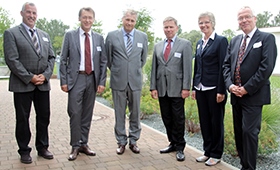Approaches to avoiding the shortage in skilled workers: Demography conference in Halle
BIBB presents innovative potential approaches for action from pilot projects
37/2015 | Bonn, 27.08.2015

It is apparent that small to medium sized companies are more receptive to making wider use of the various education and training requirements and potential of young people as they make their way into working life. The aim of the specialist conference “Demography: Ensuring provision of skilled workers in central Germany – potential approaches for the future of vocational education and training” is to strengthen and reinforce this development in the area of central Germany. “We must regard the heterogeneity with respect to the differing talents, aptitudes and competencies of job applicants even more strongly as variety and as a chance to secure the availability of skilled workers” stressed Prof. Dr. Friedrich Hubert Esser, President of the Federal Institute for Vocational Education and Training (BIBB) in the opening address. Over 100 stakeholders from all areas of vocational education and training accepted the joint invitation from the BIBB as well as the Chamber of Craft Trades for Halle and the University of Magdeburg.
Small and medium sized companies (SMEs) see themselves increasingly as competing with larger corporations as well as with school and university-based education and training provision to attract suitable trainees. They are increasingly recognizing the necessity of developing a different perspective in order to search for applicants even in groups which up to now have largely not been considered. Esser further stated that “companies must not be left alone in this. It requires a joint effort from all stakeholders”. It is necessary to consolidate the interaction of politics, the economy, academia and professional practice in order to effectively support the vocational education and training of young people along the education chain.”
University Principal Prof. Dr. Jens Strackeljan emphasized the importance for the economy in the central German federal states: “The demographic development will result in the number of school leavers falling by more than a half, the situation in terms of new trainees in many economic sectors must already be described as dramatic. The federal states of the former West Germany still have this development to face. It is not just in the education and training of highly-qualified skilled workers that the Otto von Guericke University of Magdeburg is working in partnership with the economy. We also regard it as our purpose and aspiration to support companies in the area of research into vocational education and training by developing and researching new approaches for action, and to make a contribution to successfully overcoming the challenges of tomorrow.”
Together with professional practice, other academic institutions and policy makers at various levels, the BIBB and the Federal Ministry of Education and Research (BMBF) have developed a variety of concepts for action since 2011 in around 30 pilot projects dispersed around the country. Their aim is to reduce adaptation problems in the transition into education and training and to help prevent drop-outs with provision to support education and training. This specialist conference is based on the results of these pilot projects. The projects in central Germany have thus delivered specific approaches which have been tested in practice and the intention is to now implement these more widely.
“For the labour-intensive skilled crafts the results of these pilot projects are of particular relevance. This is because its current challenges - attracting new trainees and retaining and training the existing employee base – can only be solved by society as a whole“, stressed the President of the Chamber of Craft Trades for Halle, Thomas Keindorf. “For this reason, we are keen to contribute to the implementation in practice.”
It was also possible to achieve this because companies themselves were involved in the development of the training provision and were thus included in the education chain at an early stage. Examples for innovative approaches for action here include the following:
- In order to prevent subsequent drop-outs from education and training, young trainees will be offered getting started workshops in which both sides - companies and young people – can get to know each other and make preparations for the work lying ahead (projects in Annaberg and Chemnitz).
- Special continuing education modules have been developed for training personnel, for example the skilled workers involved in training, in order that heterogeneity and variety can be dealt with in a focussed manner. For example, the module “initial vocational education and training and integration in the company” presents options for successfully organising the conclusion of the training and supporting the transition into the company involved (in Meuselwitz for the Altenberger Land district).
- The pilot project “training navigator“ in Finsterwalde has integrated all regional stakeholders involved in a restructuring of the school-career transition and has interlinked existing training provision in a schematic way. This has resulted in a stable chain between general-education schools and dual education and training. A metal working training association which is working on this beyond the term of the project has taken on a leading role here.
This and other examples will be presented at the conference as “market of innovations” and offered to companies to use with their cooperation partners in the Region.
Pictures are available under www.bibb.de/pressefotos.
Contact partners at the BIBB:
Gisela Westhoff, E-Mail: westhoff@bibb.de
Marion Trimkowski, E-Mail: trimkowski@bibb.de
Contract partner at the Chamber of Craft Trades for Halle:
Andreas Nowottny, E-Mail: ANowottny@hwkhalle.de
Contact partner at the Otto von Guericke University of Magdeburg:
Prof. Dr. Klaus Jenewein, E-Mail: jenewein@ovgu.de
Specimen copy requested if printed.